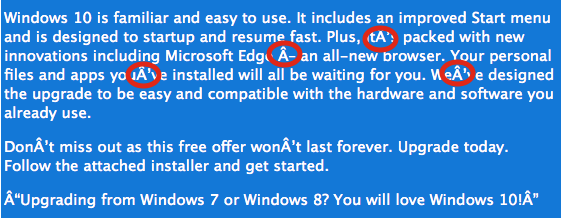“A post published to Cisco Systems’s company blog outlines how scammers are taking advantage of Windows 10’s launch to push ransomware onto unsuspecting PC users. At first glance, the emails look reasonably legit: Cisco notes that scammers are spoofing the sender’s email address to make it look as if the message is from Microsoft. Also, the blue-and-white color scheme used in the message nearly matches the colors Microsoft is using for Windows 10 marketing materials. So unless you look carefully, you could get fooled into thinking the email is actually from Microsoft.
An attached .zip file purports to be a Windows 10 installer, but according to Cisco, the attachment contains a piece of ransomware called CTB-Locker that encrypts your files and requests payment within 96 hours, lets your files be encrypted forever…
First and foremost, don’t click on any attachments you weren’t expecting, and be wary of download links in email messages. Microsoft isn’t distributing Windows 10 through email attachments or links embedded in emails. Instead, your reserved copy of Windows 10 will be automatically downloaded onto your system at some point in the next few days or weeks, and you will receive a notification on your PC when it’s time to install.”

Source: http://www.pcworld.com/article/2955121/security/dont-get-fooled-into-clicking-phony-windows-10-upgrade-emails.html
